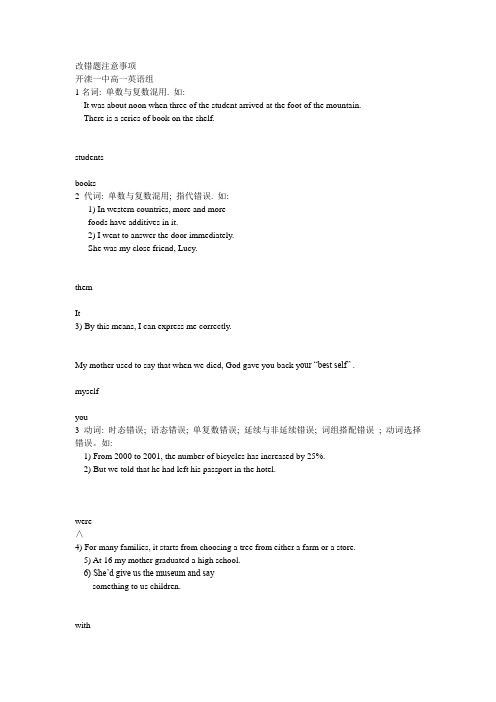高考必考语法改错之情态动词十大经典错误.ppt.Convertor知识讲解
- 格式:doc
- 大小:27.50 KB
- 文档页数:3





改错题注意事项开滦一中高一英语组1名词: 单数与复数混用. 如:It was about noon when three of the student arrived at the foot of the mountain.There is a series of book on the shelf._______students_______books2 代词: 单数与复数混用; 指代错误. 如:1) In western countries, more and morefoods have additives in it.2) I went to answer the door immediately.She was my close friend, Lucy.__them___It3) By this means, I can express me correctly.My mother used to say that when we died, God gave you back y our “best self” .__myself__you3动词: 时态错误; 语态错误; 单复数错误; 延续与非延续错误; 词组搭配错误; 动词选择错误。
如:1) From 2000 to 2001, the number of bicycles has increased by 25%.2) But we told that he had left his passport in the hotel.were∧4) For many families, it starts from choosing a tree from either a farm or a store.5) At 16 my mother graduated a high school.6) She’d give us the museum and saysomething to us children.____withfrom∧____show4形容词副词: 混用错误. 如:1) There is nothing seriously with you.2) He got on bad with his classmates.________serious___badly5冠词: 混用或缺少. 如:It gave us great pleasure to have you in our school for brief visit.Our school is planning to hold the American Film Festival next month.∧a___an6介词: 接句子和短语搭配错误; 主动和被动错误. 如:1) How I hope for a quiet place to read books or learn something without disturbed.2) He came late because the rain.3) In a summer afternoon, I went to see my uncle.∧beingOnof__∧7分词做状语和定语: 主动和被动错误.如:1) Tom arrived at the party earlier than expecting.2) He left home on a rainy night, lefthis wife and children.________expected___leaving8定语从句,状语从句和名词性从句: 连接词错误或缺少连接词. 如:1) How has it been developed intothe big business it is today?2) I was very tired that I fell asleepon my way to home.3) This is how I’m going to looklike in heaven.∧asso____what9句型使用不当: 强调句型; 比较句型; 倒装句型; 虚拟语气句型; unless从句; 形式主语和宾语句型; there be 句型; with独立结构; when句型; before句型; since句型; so…that 句型;祈使句+and/or + 一般将来时. 如:1)Sometimes I really wish that I can just be like other ordinary children.__could2) One evening we were having a partywhile the phone rang.3) There are many students in our class asthere are in our class.____when∧as10并列句缺少连词. 如:You can talk about when the American film industry started, how it has developed into the big business as it is today.While walking the dog, you werecareless, it got loose.∧and∧so / and11 并列错误. 注意对等成分。

高一辅导课情态动词十大典型错误例析五大助动词以及十大情态动词五大助动词:be、have、do、shall、will十大情态动词:can/could、may/might、must、have to、had better、need、shall/should、will/would、ought to、dare情态动词十大典型错误例析:【改错】1 Catherine can speaks a little Cantonese.(情态动词没有______和_____的变化,其后要接____________。
)【改错】2 --Could I borrow your book? --Yes. Of course you could.(______提出委婉的请求,注意在回答中不可用_______。
)对比:--Would you like to do it for me ? --Yes. I ______.【改错】3 Annie can be able to go to Beijing with you.(情态动词(____除外)+ be able to) ;(can 和be able to 都可以表示_____,意思相同,都有“______”的意思,但不能___________。
)【改错】4 Mr Liu will can write to you in English tomorrow.Mr Liu will be able to write to you in English tomorrow.(can 指主语已有的能力、条件,只用于___________时和__________时的句子中,而be able to 多指主语通过努力而“能够做某事”,它可用于__________的句子中。
)【改错】5 Amanda can’t only sing but also dance.(can not 常可缩写为_________, 但后跟only 之类的词时,需要用___________, 因为not是修饰后面的词,而不是can, 既构成__________ …________ 这个词组形式。
)【改错】6 —Where is Patricia? —She can be in the lab.(情态动词must, may, can 都可表示“推测”。
must 表示推测,可能性_______,“一定、必定”,只用于__________,它比______ 要肯定得多。
在否定句和疑问句中用_______和_______。
) 【改错】7 Richard can come back this afternoon.(can 与may都可以表示“______”,can常用在______和______中,may 常用在______中。
) 【改错】8 I wish I can fly to the space station in a spaceship one day.(动词wish 虽是现在时,而后面从句中的情态动词一定要用过去式_______/_______, 而不使用can/will。
这是一种特殊的表达方式,表示wish 后面说的是__________________愿望。
) 【改错】9 You had better not to come here tomorrow.(had better 是个复合情态动词,没有_____、_____和_____的变化,其后直接跟______________。
中外,在表示对别人劝告、建议时,不宜用在与陌生人、长辈及上级的交谈中,因为这往往被认为不太礼貌。
) 【改错】10 He ran after the bus, and could catch it.(表示过去特定情况下的能力,可用_____________________ 而不能用could,不过这种差异在否定句中便不存在了。
如:He ran after the bus but _______________/ couldn’t catch it.) 【改错】11 You maybe right.( may be 是“__________+___________”,在句中作________;maybe 是_____词,意为“_______、______”,不能作________。
)【改错】12 May you help me with my English, please?(may 用于请求时,只用于主语为_________的一般疑问句中。
May ___/____…?请示别人帮助,应用“_______/_____ you…?”或“_______/______ you …?”而不用“May you…?”) 【改错】13 —May I come in? —No, you may not.(对May I /we…? 提问,其否定回答用:No, ____ _______。
mustn’t 只用来告诉人们不该做或不许做的事情,意为“________”。
否定回答还可用Sorry, you______. / No, you ______。
)【改错】14 I wish to go to Disneyland in HK now, don’t I?(当陈述部分是“I wish / want …”时,其后附加疑问部分应该用_______的肯定式。
)【改错】15 He may have given you more help, even though he was very busy.(在通常情况下,may 和might 均可用来表示________,但是当要表示过去可能发生而实际未发生的事时,通常只能用“might + _____ + __________”。
同样,下面一句中的might 也不能换成may:It was really very dangerous. I __________________(kill) myself. 那真的是太危险了,我差点没命了。
)【改错】16—Must I stay here? —No, you mustn’t.(对于问句的否定回答应用_________/_______________, 而不能用mustn’t。
)【改错】17—Need she go there with you? —Yes, she need.(在回答need 提的问题时,否定回答用________, 肯定答复时须用________。
【改错】18I needn’t to have a pen because I’ve already got one.I don’t need to have a pen because I’ve already got one.(need 既可作情态动词,也可作实义动词。
作情态动词时,具有情态动词的特点,主要用于________ 和_________;用作实义动词时,具有实义动词的特点,有人称、数的变化,后接__________________。
) 【改错】19You mu stn’t go to school at all on Sunday.(mustn’t 是“绝对不可、不准”之意,有命令口吻。
若表达“用不着、无须、不必”等意味时,要用_________/_____________)。
You needn’t talk like that any more. (有极强的命令口吻时,要用___________。
)【改错】20In order to go to college, we must have to work hard.(must 和have to 都有“不得不”的意思,不能_____________。
)【改错】21Charles must study hard to pass the exam.(表示从客观上不得不时,要用____________。
)You have to tell your reason.你必须说出你的理由。
(表示从主观上认为有义务或有必要时,要用__________。
)【改错】22The good news mustn’t be true.(对未知事情有所推测,肯定用________, 否定用_______。
)【改错】23Jennifer dare not to say what she thinks.Jennifer doesn’t dare to say what she thinks.(dare 和______ 用法一样,在_________句和________句中既可用作情态动词,也可用作普通动词,在肯定句中只用作_____________。
)【改错】24Will I go shopping with Christina?( “______ I /We…?”是一种固定句式,表示“我(们)……好吗?”用于向对方征求意见。
“_______ you…?”的意思是“你(们)……好吗?”用于向对方提出请求。
)【改错】25Don’t forget, won’t you?(肯定形式的祈使句要用won’t you 进行反问,也可以用will you。
否定形式的祈使句后,只胡用__________ 来进行反问。
)Let’s go to Taiwan, will you?(Let’s 表示说话者与对方都在其内,故其后的简短问句要用“________ we?”。
)。